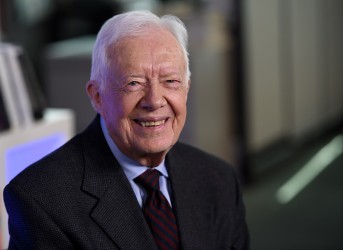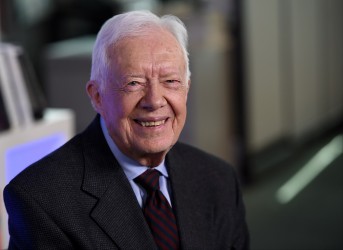Having visited 297 polling stations on election day – 13% of the total number – the Carter Center Election Observation Mission saw no major problems in procedures and none of the polling agents for the now opposition PPP/C or APNU+AFC lodged any complaints at 98% of the stations.
The mission’s findings in its recently released preliminary statement raise further questions about the case now being made by the opposition PPP/C that the elections were riddled with irregularities. The PPP/C is planning to lodge an election petition challenging the results of the May 11th general elections.
Six medium-term observers from the Atlanta, Georgia-based Center were present in the country in advance of the elections and 53 monitors from 26 countries toured polling stations in all 10 regions to observe all parts of the process on polling day.

In its statement on May 27, the Center said that at 98% of stations visited observers reported that their overall view of the election environment and the process was positive.
“Observers reported a generally calm and peaceful atmosphere during the day. The implementation of procedures was assessed positively at all stations observed during the polling period, and no major irregularities were reported. Polling staff at stations observer were well-trained and highly knowledgeable of voting procedures. Voting progressed with very few technical errors and in a manner that protected the integrity of the vote”, the statement said.
Furthermore, it said that political party agents were present at 97% of polling stations visited. APNU+AFC agents were present at 97% of the polling stations visited while PPP/C agents were present at 90%. It added that at 98 percent of the stations observed, no complaints had been submitted to presiding officers.
The Carter Center observed the counting of votes at 22 polling stations across the country. It said that during the counting process, statements of poll were completed according to procedures in polling stations visited, and party agents and citizen observers were invited to sign and receive copies of the results. The accounting for ballots, ballot sorting, and reconciliation followed regulations either fully or adequately in almost all of the reports, although observers reported some confusion in relation to ballot accounting procedures. Representa-tives of the two biggest parties were present in all polling stations observed, the statement said. Several Carter Center teams also monitored the transport of materials to, and operations at, the returning officers’ offices. No complaints were filed regarding the counting process at any of the stations observed by the Carter Center.
Tabulations
Returning officers performed their regional tabulations in the 10 regions, based on the collated results from deputy returning officers. Carter Center observers, the statement said, were present at returning officers’ offices in 9 of 10 regions until May 13.
“Carter Center obser-vers remained in Regions 2, 4, 5, and 6 to observe tabulation and maintained contact with returning officers and political party representatives in the remaining districts through the declaration of results at the district level. Observers reported that returning officers conducted their work in an open manner and that party representatives were present and observed all stages of the process. The law requires that returning officers declare results of their tabulations regionally. However, as a practical matter, the returning officers were directed not to declare their regional results before crosschecking them with the central tally of the chief election officer in Georgetown. This additional layer of checking, while enhancing the certainty of the results declared, slowed the regional declaration process”, the Center said.
On the matter of Statements of Poll which forms the basis of the continuing PPP/C complaints, the Center found no problem with the process.
“Certified copies of the results, the “Statements of Poll” or SoPs, were transmitted from each polling station to the deputy returning officers, who then forwarded them to the returning officer. Sealed copies of the SoPs were sent, separately, to the Chief Election Officer (CEO) for central tabulation at the GECOM command center in Georgetown. Returning officers performed parallel tabulation in the 10 regions, based on the aggregated results from deputy returning officers.
“Carter Center observers continued to observe the transmission and tabulation of results at all levels in all 10 regions on May 12 and 13. From May 14-16, the Carter Center maintained observers in four districts and kept in contact with party and GECOM officials as district results were tabulated and declared, and observed the central tabulation process at the national level in Georgetown. Carter Center observers maintained a presence 24 hours a day and were not limited in their access to the data entry rooms of GECOM. Observers did not report any significant irregularities”, the statement said.
Youth
The Center noted that the political parties contesting the election targeted a considerable amount of the campaign messages at younger voters, who were thought to make up an increasingly growing segment of the electorate. When the parties released their lists of electors, they also went out of their way to emphasize the number of young politicians on their lists.
“Despite this, one of the main political parties, the PPP/C, devoted a considerable amount of its campaign rhetoric to the history of electoral malpractice and the role of the military under the PNC dictatorships of the past. This focus may not have resonated with a young electorate looking to the future”, the Center said. This criticism of the PPP/C campaign has been made by others. Former President Bharrat Jagdeo was the key architect of the PPP/C’s focus on the PNC’s past.
Campaign financing
The Center asserted that campaign finance regulations should “enforce” a transparent process, particularly given the major advantage of resources available to the incumbent.
It said that Guyana’s legal framework is particularly weak in the area of campaign finance, and the lack of laws enabled great inequalities between political parties.
“There are no rules on party and campaign finance beyond ceilings for election expenditure and a simple requirement that declarations of electoral expenses must be submitted to GECOM after the elections. The law limits spending by a candidate to $25,000 GYD ($120 USD), and by parties to an additional $50,000 GYD ($240 USD) per candidate. These sums are unrealistically low compared to actual spending on the campaign. Statements of election expenses are required by law to be submitted to the chief election officer within 35 days of the declaration of results, but there is no legal provision to enforce the spending limits. Going forward it will be important to introduce laws on party finance that create greater transparency”, the Center stated.
It said that while both of the main parties seemed able to command significant resources for their campaigns, “there appeared to be a very weak distinction between the resources of the ruling PPP/C and of the state.”
Jagdeo
Noting that on April 29, a code of conduct for political parties was signed by all parties contesting these elections, the Center said that the code is noteworthy for its lack of any legal powers of sanction, essentially a voluntary code agreed by the parties. It pointed out that though some complaints were submitted to GECOM, it lacked powers of enforcement.
“No action was taken, beyond public exhortations to all parties to refrain from behavior that could amount to an electoral offense. Nonetheless, a private prosecution was brought before the courts regarding an alleged offense of `taking any action, or advancing, disseminating, or communicating any idea, which may result in racial or ethnic division among the people.’ This case was taken against former President Bharrat Jagdeo, alleging that during a speech he delivered on March 8 he was racially divisive, stirring up hatred, contrary to section 139 D of the Representation of the People Act. While it is laudable that a private citizen would take such an initiative, it would be more appropriate if such matters were prosecuted by the state”, the Center asserted.
The private prosecution was brought by commentator Christopher Ram.









